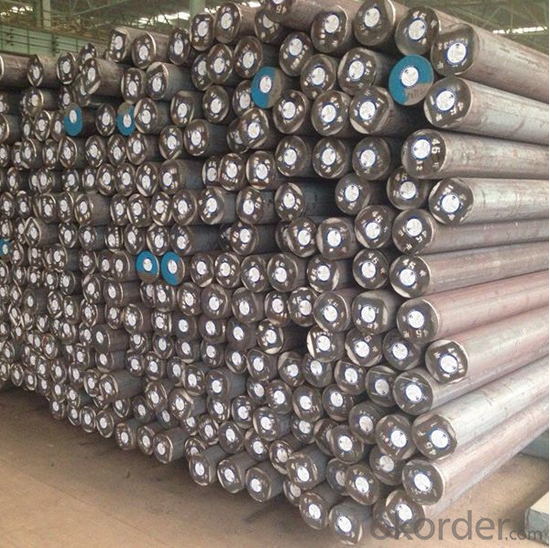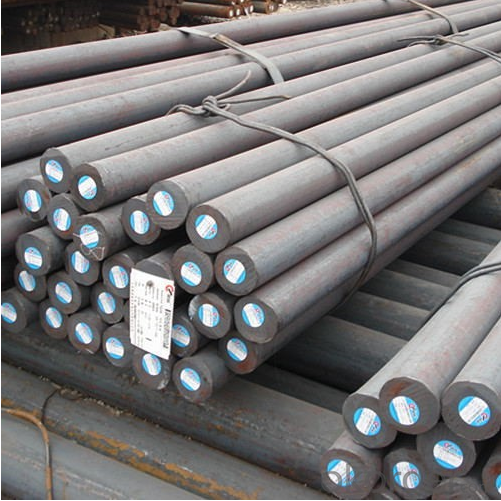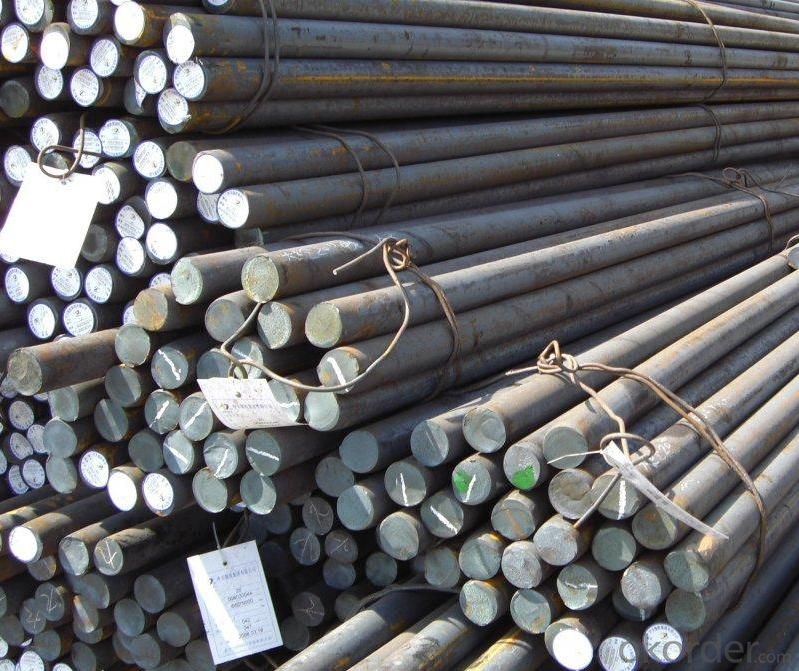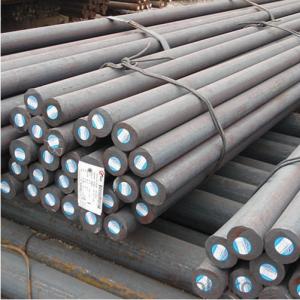C45 Steel Round Bar for Constructure Material
- Loading Port:
- Shanghai
- Payment Terms:
- TT or LC
- Min Order Qty:
- 25 m.t.
- Supply Capability:
- 500000 m.t./month
OKorder Service Pledge
OKorder Financial Service
You Might Also Like
Item specifice
C45 Steel Round Bar for Constructure Material
Product Description:
1. Sizes: Diameter: 16mm-300mm; Length: 6m, 9m, 12m
2. Grade: 45#, astm1045, S45C,C45
3. Invoicing on theoretical weight or actual weight as customer’s request
4. Shape: Round bar, solid bar of steel with circular section
5. Technique: Hot rolled, forged, cold rolled
Chemical Composition:
C | Si | Mn | P | S | Ni | Cr | Cu |
0.42-0.50 | 0.17-0.37 | 0.50-0.80 | ≤0.035 | ≤0.035 | ≤0.30 | ≤0.25 | ≤0.25 |
Packing and Delivery:
Packing in bundle with steel strips and shipped by break bulk vessel or container (depend on target market and different ports)
Delivery Detail: Approx.45 days
Usage and Applications
1. Steel round bar is used in a large number of architectural and engineering structures. Or it can be used in construction of plants for the production of steel house frames, high-voltage transmission towers, bridges, vehicles, boilers, containers, ships, etc.
2. And we can use this kind of product on the performance of the mechanical parts if the demand is not very high.
3. Some especial material steel round bar can be used for main shaft of steamer, hummer shank, with big section and supper force.
Specification:
OD | Length | Material | Standard | Technique |
16-260mm | 6-12m or aques per request | 20# | GB ASTM DIN | Hot rolled |
16-350mm | 45# | |||
200-500mm | 45# | Forged | ||
20-250mm | 20Cr,40Cr,20-42CrMo | Hot rolled | ||
50-300mm | GCr15 |
Product show of C45 Steel



- Q:Is special steel suitable for manufacturing precision components?
- Yes, special steel is indeed suitable for manufacturing precision components. Special steel possesses unique properties such as high strength, wear resistance, and excellent dimensional stability, making it ideal for producing components with precise and intricate designs. Additionally, its superior machinability and ability to withstand extreme conditions further enhance its suitability for manufacturing precision components.
- Q:How does special steel contribute to the strength of products?
- Special steel contributes to the strength of products through its unique composition and manufacturing process. By incorporating specific alloys and heat treatments, special steel enhances the material's durability, toughness, and resistance to wear and corrosion. This increased strength allows products made from special steel to withstand higher loads, pressures, and extreme conditions, making them more reliable and long-lasting.
- Q:What are the main characteristics of corrosion-resistant castings?
- Corrosion-resistant castings have been designed to endure the destructive effects of corrosion, a natural process that causes the deterioration of metal surfaces due to chemical reactions. These castings possess several key features that render them impervious to corrosion. First and foremost, corrosion-resistant castings are fashioned from specific alloys or materials that possess inherent resistance to corrosion. These materials may consist of stainless steel, nickel-based alloys, or high-performance alloys such as Inconel or Hastelloy. These alloys contain elements like chromium, molybdenum, or nickel, which generate a protective layer on the casting's surface, preventing the infiltration of corrosive agents into the underlying metal. Secondly, meticulous casting techniques are employed in the production of these castings to ensure a solid and defect-free structure. This is crucial in warding off the penetration of corrosive substances into the castings. Techniques such as investment casting or vacuum casting are commonly utilized to achieve a high degree of precision and quality. An additional significant characteristic of corrosion-resistant castings is their ability to withstand various types of corrosion, including general corrosion, pitting corrosion, crevice corrosion, and stress corrosion cracking. General corrosion refers to the gradual and uniform deterioration of the metal surface, while pitting corrosion leads to the formation of localized holes or pits. Crevice corrosion occurs in confined spaces such as gaps or joints, and stress corrosion cracking arises from the combined effects of stress and a corrosive environment. Corrosion-resistant castings are designed to endure all these types of corrosion, ensuring long-lasting durability and dependability. Furthermore, corrosion-resistant castings often undergo additional surface treatments or coatings to enhance their resistance to corrosion. These treatments may encompass passivation, where the surface is treated chemically to create a protective oxide layer, or the application of protective coatings such as epoxy or polyurethane. These treatments provide an additional layer of defense against corrosive agents, prolonging the lifespan of the castings. In conclusion, the primary characteristics of corrosion-resistant castings include the utilization of corrosion-resistant alloys, meticulous casting techniques, resistance to various types of corrosion, and the application of surface treatments or coatings. These characteristics ensure that these castings can endure harsh environments and maintain their structural integrity over time, making them ideal for applications where corrosion poses a significant concern.
- Q:What are the different methods of testing the quality of special steel?
- There are various methods to test the quality of special steel, including mechanical tests such as tensile testing, hardness testing, impact testing, and fatigue testing. Additionally, chemical analysis techniques like spectroscopy and metallography can be used to determine the chemical composition and microstructure of the steel. Non-destructive testing methods like ultrasonic testing and magnetic particle inspection are also commonly employed to detect any defects or anomalies in the steel.
- Q:How does special steel contribute to the automotive safety?
- Special steel contributes to automotive safety in several ways. Firstly, it provides increased strength and durability to the vehicle's structure, which helps to absorb and distribute impact forces during collisions, thus protecting the occupants. Secondly, special steel is often used for manufacturing components like airbags, seat belts, and anti-lock braking systems, ensuring their reliability and effectiveness in critical situations. Additionally, this type of steel can enhance the vehicle's resistance against corrosion, reducing the risk of structural damage over time. Overall, special steel plays a vital role in enhancing the safety standards of automobiles.
- Q:What are the different applications of special steel in the construction industry?
- Special steels have a wide range of uses in the construction industry, serving as versatile materials. Structural components are one of the main applications of special steel in construction. Buildings, bridges, and infrastructure projects that require exceptional strength and durability often use special steels, including high-strength low-alloy (HSLA) steel and weathering steel. Apart from structural uses, special steel is extensively employed in pipeline construction. This is particularly significant for oil and gas pipelines, where corrosion resistance and the ability to withstand high-pressure conditions are vital. Stainless steel, for example, is commonly chosen due to its outstanding resistance to corrosion, which makes it ideal for harsh environments. Another important application of special steel in construction is the production of reinforcing bars, also known as rebars. Reinforcing steel bars reinforce concrete structures like buildings, bridges, and highways by adding strength to withstand tension forces. Special steel rebars, such as micro-alloyed steel or carbon steel, are designed specifically to enhance the durability and structural integrity of concrete structures. Furthermore, special steel is extensively used in the construction of high-rise buildings and skyscrapers. The exceptional strength, ductility, and fire resistance properties of special steels like carbon steel or alloy steel make them perfect for constructing tall structures capable of withstanding heavy loads and resisting fire incidents. Special steel also finds application in the construction of equipment and machinery used in the construction industry. For instance, high-speed steel (HSS) is commonly utilized in manufacturing cutting tools, drill bits, and saw blades, which are essential for various construction activities. HSS possesses exceptional hardness, wear resistance, and high-temperature strength, making it suitable for heavy-duty cutting and drilling applications. In conclusion, special steel is an essential material in the construction industry due to its superior strength, durability, corrosion resistance, and fire resistance properties. It serves various purposes in structural components, pipelines, reinforcing bars, high-rise buildings, and construction machinery. Special steel ensures the safety, longevity, and reliability of construction projects, making it indispensable in the industry.
- Q:What are the main applications of special steel in the packaging industry?
- Special steel is widely used in the packaging industry for a range of applications. One of the main uses is in the manufacturing of packaging machinery, such as filling machines, sealing machines, and wrapping machines, where the high strength and durability of special steel components ensure smooth operation and longevity. Additionally, special steel is utilized for the production of packaging tools, like cutters, blades, and molds, which require resistance to wear and corrosion. The use of special steel in the packaging industry helps to enhance productivity, improve product quality, and ensure the safety and integrity of packaged goods.
- Q:How does special steel contribute to the oil and gas industry?
- Special steel plays a crucial role in the oil and gas industry by providing strength, corrosion resistance, and durability to equipment and infrastructure. It is used in the construction of pipelines, drill pipes, wellheads, valves, and various other components. The unique properties of special steel enable it to withstand harsh operating conditions, high pressures, and corrosive environments, ensuring the reliability and safety of oil and gas operations.
- Q:Can special steel be welded?
- Yes, special steel can be welded.
- Q:What are the different nuclear grades of special steel?
- Special steel grades with different nuclear classifications are utilized in the nuclear industry to adhere to strict safety, reliability, and performance standards. These grades are engineered to endure the challenging conditions present in nuclear power plants and other nuclear facilities. There exist various nuclear grades of special steel, each possessing distinct characteristics and applications. Some commonly utilized grades include: 1. 304/304L stainless steel: This grade boasts exceptional resistance to corrosion and high strength at elevated temperatures, making it widely employed in nuclear applications. It finds use in the fabrication of reactor vessels, heat exchangers, and piping systems. 2. 316/316L stainless steel: Similar to 304/304L, this grade offers superior resistance to corrosion and high creep strength. It is commonly employed in the construction of components exposed to corrosive environments, such as coolant systems, steam generators, and fuel handling equipment. 3. 321 stainless steel: This grade contains titanium, which stabilizes the steel during welding to prevent sensitization. It frequently finds application in nuclear scenarios involving welding, such as piping systems and pressure vessels. 4. Duplex stainless steels: These grades, including 2205 and 2507, combine high strength with excellent corrosion resistance. They are frequently employed in nuclear applications that involve highly corrosive environments, such as seawater-cooled systems and containment structures. 5. Low alloy steels: These steels, such as A533B and A508, are used in the construction of reactor pressure vessels due to their exceptional strength and toughness. These grades are specifically designed to withstand the extreme conditions within a nuclear reactor. It is crucial to consider specific factors such as temperature, pressure, corrosion resistance, and mechanical properties when selecting the appropriate nuclear grade of special steel for a given application. Rigorous testing and quality control measures are implemented to ensure the suitability of these grades for use in the nuclear industry.
1. Manufacturer Overview |
|
|---|---|
| Location | |
| Year Established | |
| Annual Output Value | |
| Main Markets | |
| Company Certifications | |
2. Manufacturer Certificates |
|
|---|---|
| a) Certification Name | |
| Range | |
| Reference | |
| Validity Period | |
3. Manufacturer Capability |
|
|---|---|
| a)Trade Capacity | |
| Nearest Port | |
| Export Percentage | |
| No.of Employees in Trade Department | |
| Language Spoken: | |
| b)Factory Information | |
| Factory Size: | |
| No. of Production Lines | |
| Contract Manufacturing | |
| Product Price Range | |
Send your message to us
C45 Steel Round Bar for Constructure Material
- Loading Port:
- Shanghai
- Payment Terms:
- TT or LC
- Min Order Qty:
- 25 m.t.
- Supply Capability:
- 500000 m.t./month
OKorder Service Pledge
OKorder Financial Service
Similar products
New products
Hot products
Related keywords





























